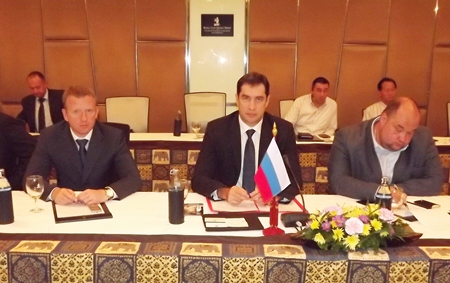Russian Federation Consul Andrey Dvornikov told police and city officials that, due to increasing crime against tourists, Pattaya is gaining a growing reputation back home for being unsafe.
At a Nov. 19 meeting between Thai and Russian officials and tour operators, the embassy counselor cited the increasing frequency of gold and handbag snatches and hotel burglaries, saying crimes are being reported in Russia with many travelers forming negative impressions of safety in Pattaya.
 Evgeny Pisarevskiy (center), Deputy Head of the Federal Agency for Tourism (Rosturism) and Russian officials address local officials and businesses about the challenges faced by Russian tourists in Pattaya.
Evgeny Pisarevskiy (center), Deputy Head of the Federal Agency for Tourism (Rosturism) and Russian officials address local officials and businesses about the challenges faced by Russian tourists in Pattaya.
Dvornikov blamed the increase in crime to the termination of joint Pattaya Police-Royal Thai Navy patrols earlier this decade. Ended due to budget constraints, the Military-Police Cooperative Patrol Project was supposed to be restarted in May 2009 following a mandate from then-Gov. Senee Jittakasem. But despite calling the program “essential” for tourism, the plan was sent to a committee for study, never to reemerge.
The Russian consul also was critical of Thai officials for the common practice of hotels taking tourists passports. He said passports were property of the Russian government and that Thai officials showed “negligence” in instructing hotels to demand and hold them.
Dvornikov’s criticisms came as embassy and Pattaya officials met to address the major concerns faced by Russian tourists, with security and medical coverage topping the list. The forum also gave local business leaders a chance to meet with Russian tourism executives in hopes of keeping their business juggernaut going.
The Russian delegation said their main concerns focused on information services for tourists, insurance, medical expenses and the general perception of security. Evgeny Pisarevskiy, Deputy Head of the Federal Agency for Tourism (Rosturism), pointed, in particular, to the disparity in the prices charged to Thais and Russians for medical care.
Deputy Mayor Ronakit Ekasingh said communication remains the biggest obstacle Pattaya public officials and business owners have in dealing with Russians, due to low Russian-language fluency. But Ronakit also criticized Russian tourists, saying many can’t read or ignore warning signs posted around the city, leading to their injury or death.
He said the city is addressing the language barrier by allocating funds to the Pattaya Business & Tourism Association to distribute for training.
The deputy mayor also addressed the city’s highest-profile tourist problem: jet skis. He said the long-running extortion and intimidation scandal has gotten the notice of Prime Minister Yingluck Shinawatra, who designated the country’s national security director to oversee resolution of the issue.
Still being debated in committee, the proposed solution involves requiring jet ski vendors to carry insurance to cover any damage.
As for medical services, Ronakit said, the area is served by numerous rescue services that can reach those in need within 10 minutes. He suggested Russian tour operators enter insurance contracts with those agencies and area hospitals to improve efficiency.
With Russian tourists having already spent more than 1 billion baht in the kingdom, Thai officials are keen to keep their largest new tourist bloc happy. As such, government and business representatives from both sides agreed to hold similar meetings again on a regular basis.




